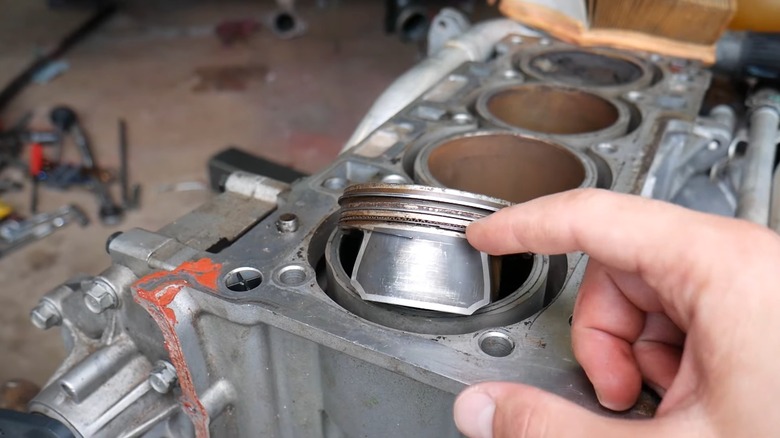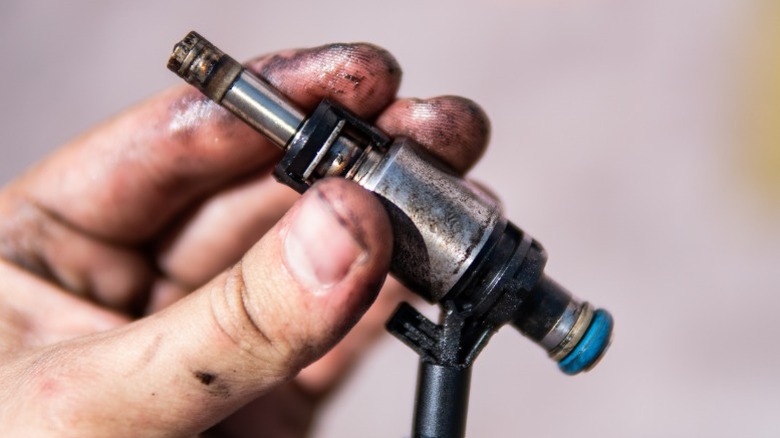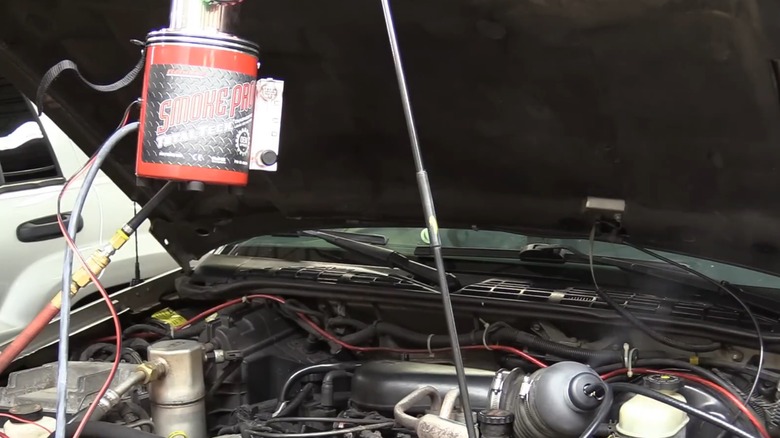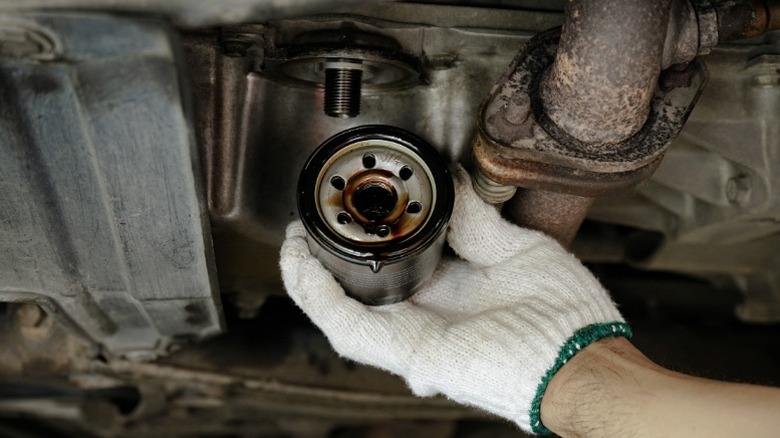6 Reasons Why Your Engine Oil May Smell Like Gas (And What To Do If It Does)
You probably already know that your car relies on various different fluids to help it run smoothly. Two of the most well-known and recognizable of those fluids are engine oil and fuel, which, in many passenger vehicles, is gasoline. Both fluids are vital for internal combustion engines, as gas represents the fuel source that the engine uses for power, while oil is the lubricant that keeps all the internal parts moving smoothly while also helping with heat dissipation.
Under normal circumstances, these fluids should really never come into contact with each other. They both flow through distinct channels and are supposed to be contained within their individual systems. However, if you've been around cars for long enough, you know that automotive parts and systems are prone to wear and tear over time and various malfunctions can occur, resulting in things like performance problems and mechanical defects. One particularly unsettling issue that may occur if there's a problem with your vehicle's fuel or engine lubrication systems is a gas smell coming from your engine oil.
There are various reasons why your engine oil may smell like gas. However, it's not always easy to identify the root cause. Some issues may be obvious — for example, if you're a car novice, you may accidentally fill your engine with gasoline instead of the fuel tank. That's pretty extreme, though, and you'll probably realize pretty quickly if you make that mistake. Other potential causes include worn-out fuel injection components, bad piston rings, and poor driving habits. As a former professional auto repair technician, I'll break down some of the most common reasons why your engine oil may smell like gas and what to do if you experience the issue yourself. Let's dive in and check it out.
You may have worn-out or damaged piston rings
Engine blow by is a relatively common problem that can cause your engine oil to smell like gas. It occurs when gas, or a mixture of air, gas, and oil, slips past the piston rings into the crankcase, the chamber that houses the engine's crankshaft along with large amounts of oil for lubrication. While a small amount of blow by is to be expected, even in healthy engines, large amounts indicate a problem and can cause various issues for your car and its performance.
Generally, severe blow by happens when the engine's piston rings are no longer able to provide a proper seal between the combustion chamber and the crankcase. It usually occurs due to wear and tear over time, improperly installed or incorrectly fitting pistons and rings, overheating, or poor lubrication. Most modern engines are equipped with a positive crankcase ventilation (PCV) valve to combat this issue by recirculating unburned fuel back through the air intake system. However, if the blow by is bad enough, it can overwhelm the PCV system and cause some fairly severe problems.
As mentioned, the crankcase houses the crankshaft, which relies on engine oil for lubrication. Because blow by allows gas to slip into the crankcase, mixing with the oil, it can cause the oil to start smelling like fuel. However, that's not the only symptom of blow by that you may experience. Other signs of engine blow by and worn-out piston rings include excessive exhaust smoke, poor engine performance, misfires, a rough idle, overheating, and increased oil burning. You can check for worn-out piston rings by performing a compression test and a physical inspection. However, bad piston rings aren't the only thing that can cause compression drops, and you may need a professional's help to diagnose the problem definitively.
Your engine may be misfiring
Engine misfires are another potential reason why your oil may smell like gasoline. This issue can be closely connected to engine blow by and worn-out piston rings, as misfires can increase blow by and vice versa. However, it's also very common for misfires to be caused by another engine problem. Misfires are generally the result of a problem with the combustion process, like when one or more cylinders fails to fire properly. However, the root cause can be tricky to diagnose, thanks to the various issues that can result in engine misfires.
An engine misfire can cause various symptoms itself. Physically, it may feel like your car is hesitating or hiccuping, and you may notice things like a rough idle and difficulty accelerating. You may also notice a check engine light appears on your dash, as well as excessive exhaust smoking, increased oil consumption, and engine overheating issues. Engine misfires can also cause your oil to smell like gas, thanks to that connection to blow by that we mentioned earlier. That's because misfires can coat the walls of the combustion chambers with gas, which, over time, can reduce compression and allow more blow by to slip past the piston rings.
Remember, though, that these issues can be interconnected. Engine misfires can be caused by lots of different issues, including problems with the fuel, electrical, and emissions systems, as well as things like bad spark plugs, grime buildup, and more. If your engine oil smells like gas, and you suspect that misfires are to blame, the smartest move is to visit a professional mechanic for an inspection.
You frequently drive your car for very short distances
Remember how we mentioned that a small amount of engine blow by is normal, even in new and healthy engines? Well, that normal blow by becomes intensified each time you start your engine when it's cold. It's due to the fact that your engine requires extra fuel to help it get going when it's cold out. That extra fuel is necessary because, at low temperatures, gasoline becomes denser and more difficult to evaporate. Your vehicle's fuel system accounts for this issue by spraying additional fuel into the combustion chambers until the engine warms up. However, the trade-off is that not all of that extra fuel gets burned — some of it slips past the piston rings in the form of blow by.
As mentioned, small amounts of blow by are normal, especially when your engine is cold. The problem arises when you cold-start your car over and over again without ever giving the engine a chance to get hot. It doesn't necessarily have to be extremely cold outside for this to happen, either.
If you're someone who regularly drives your car for only very short distances, like between different job sites in a housing development or for incredibly quick commutes, your engine is likely to produce increased levels of blow by. That means that more unburned gas may make its way into your engine oil, which can cause the oil to develop a fuel odor. While you may be unable to avoid short commutes, thanks to your job or other commitments, you can help combat the issue by performing more frequent oil changes.
You may have faulty fuel injectors or a bad carburetor
The fuel system is one of your car's most vital components. It's responsible for pumping gas or diesel from the fuel tank, through a series of hoses and a filter, to the engine, where it's burned in the combustion chambers. Depending on your vehicle's age, if it runs on gasoline, it most likely relies on either a carburetor or a fuel injection system. The way in which these two types of fuel delivery systems work differs. However, the core responsibility remains the same: to deliver fuel to the engine for combustion.
Despite these systems' importance, they're prone to wear and tear over time. Various things can go wrong with the fuel system, from leaks to clogs and various types of mechanical failure. When these systems do start malfunctioning, they're liable to cause some unpleasant and potentially debilitating symptoms for your car, including making your oil smell like gas. For vehicles with modern fuel injection systems, the fuel injectors can fail, allowing gas to drip down through the combustion chambers and make its way into the engine oil supply.
Carburetors don't shoot fuel into the combustion chambers in the same way as injectors — rather, these devices mix air and fuel together before sending it to the engine. However, like fuel injectors, carburetors can fail over time due to age, damage, or grime buildup. When that occurs, the carburetor may allow fuel to leak into the engine, which can end up mixing with the oil, causing it to take on a fuel odor. Other signs of fuel system problems include performance drops, the presence of a dashboard warning light, difficulty starting the engine, and a reduction in gas mileage.
Your car may have an EVAP malfunction or problem with the PCV valve
We already mentioned the PCV valve briefly. However, we didn't cover it as a potential reason why your engine oil may smell like gas. Remember that the purpose of the PCV valve is to vent fuel vapors out of the crankcase through the air intake system back into the engine. It's meant to combat the blow by that occurs as part of normal engine operation, but if the PCV valve fails, it may be unable to vent those gas fumes out of the crankcase, leading to fuel mixing with the oil and a strong gas odor. Besides causing your oil to smell like gas, a faulty PCV valve can cause performance problems, increased oil use, a check engine light, oil leaks, and various other issues.
Another potential reason why your engine oil may smell like gas is a leak in the evaporative emission control (EVAP) system. Similar to the PCV valve, the EVAP system is responsible for recycling excess fuel vapor through the intake manifold to the engine. It works by collecting the gas vapor that builds inside the fuel tank in a charcoal canister. The system works with the car's computer to send those gasses back through the engine to prevent excess air pollution and aid in efficiency.
However, an EVAP system malfunction can cause the engine to run rich or, in other words, receive too much fuel. This can increase blow by, resulting in gas mixing with the oil to develop a smell. An EVAP leak can also allow fuel vapors to escape, leading to a fuel odor in and around the vehicle. In addition to causing a gas smell, an EVAP problem is likely to illuminate your car's check engine light.
Maybe you've just gone too long in between oil changes
If your car runs on fossil fuels, then it also needs oil to lubricate the engine's internal moving parts. As mentioned previously, engine oil is vital for providing lubrication to prevent friction and help dissipate heat. However, it degrades relatively quickly, and most drivers need to change the oil every 3,000 to 7,500 miles. If you go too long without changing your oil, not only will it begin to break down and lose its ability to lubricate the engine's internal components, but it can also begin smelling like gasoline.
This happens because, as we've outlined above, it's normal for small amounts of gas to get into the crankcase and oil pan during normal operation. When you change your oil regularly, as outlined by your car's manufacturer, those small amounts of gas don't have enough time to build up and cause a smell. But if you never replace your oil or allow an extremely long time to pass in between replacements, those small amounts of blow by and gas vapors can build up and cause a pretty overwhelming stench.
While the smell may be unsettling, a gas odor is only one of the reasons why you should never skip an oil change. Doing so can lead to numerous problems, including engine overheating, mechanical failure, and even complete engine seizure. You can replace your oil at home relatively easily. Not only is it one of the best DIY auto projects for beginners, but it's also one of the best and most affordable ways to extend your car's lifespan and keep it running smoothly for the long haul.
What to do if your engine oil smells like gas
Pulling the dipstick to check your oil and noticing a gas smell can be worrying. If it happens, you may wonder what your next steps should be. One of the first things you should do, especially if it's been a while since your last oil change, is drain the old engine oil and replace it with fresh oil of the correct viscosity. If there's enough gas in your oil to cause it to smell, it may not be able to lubricate the engine properly, potentially leading to overheating and engine damage. Draining the corrupted oil out and refilling the engine with clean oil is the best way to address that part of the problem. However, unless you're sure that your engine oil smells like gas because you've gone a long time since changing it, it's still smart to identify the odor's root cause.
The problem is that unless you're an experienced home mechanic, you may struggle to identify the root cause without professional assistance. The only other culprit that you may be able to identify quickly without extensive car knowledge is driving short distances frequently. If your oil smells like gas, and you commute very short distances regularly, you may be able to narrow down the source of your problem.
However, most of the other issues covered here require a professional inspection and special equipment to diagnose properly. We've already covered some of the methods mechanics use to test for the various issues that can cause engine oil to smell like gas. If you're a car novice without access to a wide range of mechanic's tools and your engine oil smells like gas, the smartest move is to visit a professional as soon as possible.







